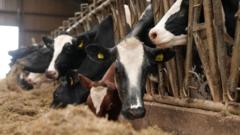Are Farmers Right to Call Livestock Virus Restrictions Futile?

Understanding Bluetongue Virus Restrictions in Wales: A Necessary Measure or an Impractical Burden?
The bluetongue virus has become a pressing concern for livestock farmers in Wales, leading to the introduction of stringent restrictions aimed at preventing its spread. While the Welsh government insists that these measures are essential for safeguarding livestock, farming unions argue that they are impractical and counterproductive. This article will explore the complexities of the bluetongue virus, the government's response, the implications for farmers, and the ongoing debate surrounding these restrictions. By the end of this piece, you'll have a deeper understanding of the bluetongue virus situation in Wales and its impact on the agricultural community.
What is Bluetongue Virus?
Bluetongue is a viral disease that primarily affects ruminants, including cattle, sheep, and goats. It is transmitted by biting midges, particularly species from the Culicoides genus. While the disease poses no threat to human health or food safety, it can be fatal for livestock. Symptoms of bluetongue may include:
- Fever
- Swelling of the face and tongue
- Discharge from the nose
- Difficulty in breathing
- Loss of appetite and weight
In severe cases, bluetongue can lead to death, significantly impacting livestock populations and, consequently, the agricultural economy.
The Current Situation in Wales
As of July 1, 2023, all cattle, sheep, and goats being transported from England into Wales must test negative for bluetongue before they can cross the border. This measure comes in response to the growing spread of the virus across England. The Welsh government aims to hold the virus at bay for as long as possible, reflecting their commitment to protecting local livestock.
Despite the government's intentions, many farmers and agricultural organizations have expressed concerns over the practicality and effectiveness of these restrictions. The situation has led to significant anxiety among farmers, particularly in regions like Monmouthshire, where livestock markets serve as vital hubs for trade and commerce.
Impacts on Farmers and Livestock Markets
The restrictions imposed by the Welsh government have raised alarms among farmers, particularly those who rely on livestock markets for their livelihoods. Phil Jones, manager of the Monmouthshire livestock market, articulated the fears shared by many in the industry. He predicted that the restrictions could reduce business by as much as 20%. Such a decline in trade would have devastating consequences for farmers and market operators alike, especially as breeding sales approach in late summer and early autumn.
Vaccination Efforts: A Path Forward?
Vaccination against bluetongue is a crucial part of the strategy for mitigating the disease's impact. Although there is an existing vaccine for cattle, it takes several weeks to become effective. Farmers like Abi Reader from the National Farmers' Union have started vaccinating their livestock but emphasize the need for a more comprehensive rollout. Reader noted that better communication and education about the importance of vaccination are essential for encouraging farmers to adopt this preventive measure.
Debate Among Stakeholders
The introduction of bluetongue restrictions has sparked a lively debate among various stakeholders, including farming unions, opposition parties, and government officials. The Farmers' Union of Wales has criticized the restrictions as impractical, arguing that enforcing a border is futile and could severely disrupt trade. The National Farmers' Union also expressed concerns that the measures are disproportionate to the actual risk posed by bluetongue.
Opposition parties have joined the chorus of criticism, with the Conservative Party calling for a more thorough analysis of the economic impact of the restrictions. Plaid Cymru has urged the government to focus on promoting vaccination and ensuring that sufficient supplies are available for farmers. The Rural Affairs Secretary, Huw Irranca-Davies, has defended the government's approach, stating that the aim is to buy farmers time and prevent the virus from entering Wales.
Looking Ahead: What Does the Future Hold?
The bluetongue virus situation in Wales is fluid and may require ongoing adjustments based on the virus's spread in England and the effectiveness of vaccination efforts. The Welsh government's commitment to keeping bluetongue out of the region reflects a proactive approach to agricultural health. However, the farming community's concerns about the practicality of these measures underscore the need for a balanced strategy that considers both biosecurity and the economic realities of livestock farming.
As farmers navigate these challenging circumstances, collaboration between government officials, agricultural organizations, and the farming community will be crucial for developing effective strategies. The hope is that through vaccinations, education, and a more pragmatic approach to trade, the effects of bluetongue can be mitigated without sacrificing the livelihoods of those in the agricultural sector.
Conclusion
The bluetongue virus represents a significant challenge for livestock farmers in Wales. While the government’s restrictions aim to protect local livestock, the practicality and impact of these measures have sparked intense debate among farmers and stakeholders. As vaccination efforts continue and discussions around trade restrictions evolve, the agricultural community must remain vigilant and adaptable. The health of livestock and the economic stability of farms are intertwined, and finding a balance between biosecurity and trade is essential for the future of farming in Wales.
Frequently Asked Questions
What is bluetongue virus and how does it affect livestock?
Bluetongue virus is a disease that affects ruminants like cattle and sheep. It is spread by biting midges and can lead to symptoms such as fever, swelling, and in severe cases, death. It poses no risk to human health or food safety.
Why has the Welsh government implemented bluetongue restrictions?
The restrictions have been put in place to prevent the spread of bluetongue from England into Wales, as the virus has been spreading across large parts of England. The Welsh government aims to protect local livestock and buy time for vaccination efforts.
What are the implications of the restrictions for farmers?
Farmers are concerned that the restrictions could significantly reduce livestock trade, particularly during breeding sale season. They also face additional costs associated with obtaining pre-movement tests and licenses for their animals.
What is the vaccination process for bluetongue and how effective is it?
Vaccination against bluetongue is available for cattle, but it takes several weeks to become effective. Farmers are encouraged to vaccinate their livestock to help mitigate the risks associated with the virus.
How can farmers adapt to the bluetongue virus situation?
Farmers can adapt by participating in vaccination programs, staying informed about the latest developments regarding bluetongue, and collaborating with agricultural organizations to advocate for practical solutions that support trade while ensuring biosecurity.
As the situation evolves, what other measures do you think should be taken to protect livestock while supporting farmers? #BluetongueVirus #WalesFarming #LivestockHealth
Published: 2025-06-28 20:58:03 | Category: wales



